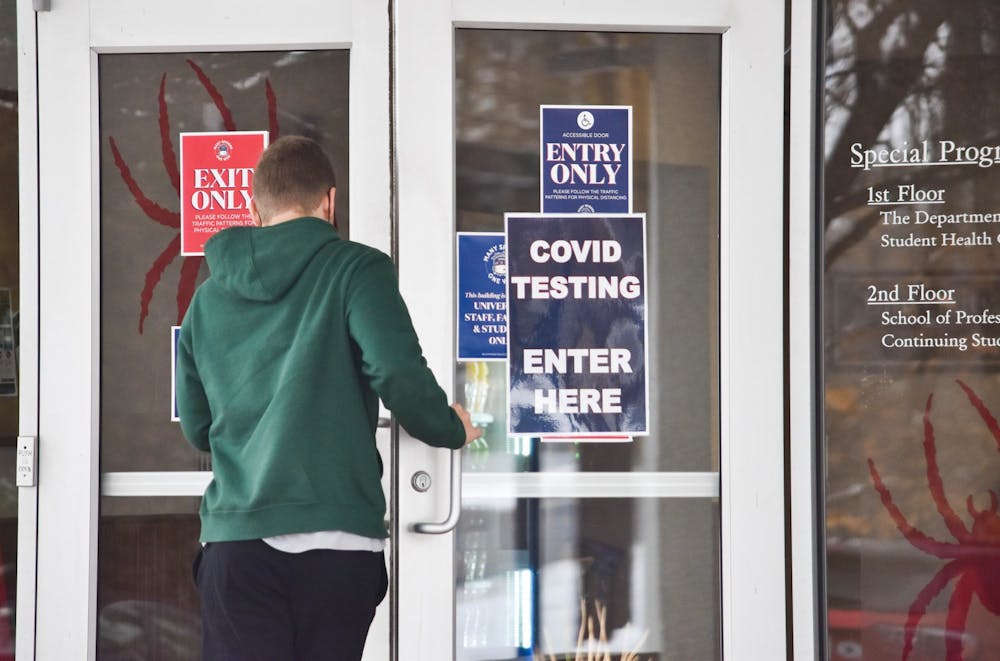Some University of Richmond students who have contracted the COVID-19 virus have faced stigma and shame surrounding their positive results, they said.
After sophomore Elina Bhagwat tested positive for COVID-19, people began questioning whether she had been thwarting health and safety guidelines, she said. Bhagwat does not know how she contracted COVID-19, she said, as she had been careful to adhere to safety guidelines and avoid large gatherings.
Bhagwat's friends have had to stand up for her when people question whether she had been following safety measures, she said.s
“I was kind of nervous about people thinking that I was being unsafe and, like, doing stupid things on campus and whatever,” Bhagwat said. “I definitely think there's a bit of a stigma there.”
While she had COVID-19, Bhagwat had mild cold symptoms, including headaches, and also lost her sense of smell. she said. She regained her ability to smell about a week after losing it, she said. Bhagwat is worried about long-term symptoms because her brother, who previously contracted the virus, is still experiencing effects on his health, she said.
Sophomore Kyle O’Connell tested positive for COVID-19 during spring semester entrance testing, he said.
O’Connell said he worried people thought poorly of him after he tested positive. Other students who have tested positive whom he has spoken with have had similar worries, he said.
“If you haven't had COVID, or like had any close friends or family members who have had it, it's kind of easy to have that stigma and think negatively about people, or like their choices,” O’Connell said. “[People were] assuming that I was somehow being reckless because I got COVID, while I was not.”
Senior Tirdod Behbehani continued to feel stigmatized even after he finished his 10 days of quarantining on campus, he said.
“A lot of people didn’t realize you don’t have to test negative to leave quarantine,” Behbehani said. “So that was annoying and difficult to explain once I got out.”
Although the recommended quarantine period had been 14 days, updated guidelines consider it safe to be around people either 10 days after COVID-19 symptoms appear and 24 hours have passed with no fever or, for asymptomatic cases, 10 days after a positive test, according to the Centers for Disease Control and Prevention.
Friends still felt nervous to see Behbehani, as the reduction from 14 to 10 days of mandatory quarantine has left some feeling uncertain, he said.
Enjoy what you're reading?
Signup for our newsletter
Stigma toward those afflicted by illness in pandemic or epidemic situations is not new, said Rick Mayes, professor of political science and co-coordinator of the healthcare studies program at UR.
Infectious diseases that have spread quickly-- such as HIV/AIDS, typhus, cholera, leprosy and tuberculosis-- scared people and led to blaming and judgment, he said. It's not surprising to see similar behaviors with COVID-19, he said.
“In confusing and disruptive times that are caused by a new disease, there is frequently a collective desire to assign responsibility and blame people for disease spread,” Mayes said. “This phenomenon can be especially cruel when the spreading of a disease like COVID-19 has more to do with some people's role as essential workers that put them in harm's way on a daily basis, while many of the rest of us stay home online and work in a safe environment.”
Disease stigma is also a byproduct of the war metaphors used in medicine, Mayes said. When people such as government or healthcare officials say, "We are waging war on COVID-19," they inadvertently make those suffering from COVID-19 part of the enemy, he said.
War language such as this is used to inspire people to collectively work against the spread of disease. But unfortunately, it also tends to pit people against those who are sick, because people assume people who get sick did not follow the rules or did something to "deserve" falling ill, Mayes said.
“One often sees this with lung cancer,” Mayes said. When a smoker gets lung cancer, lots of people see that as an unfortunate but common consequence of choosing to smoke, he said. So when someone who never smoked gets diagnosed as having lung cancer, they are likely to mention that they never smoked when sharing the diagnosis to avoid stigma, he said.
Similar justifications are offered when someone tests positive for COVID-19, he said. A UR student who tests positive might feel the need to mention that they had been following guidelines and have no idea how they got it, Mayes said. This tends to earn more sympathy because people regard some behaviors as deserving of COVID-19 and others as not, he said.
Newsletter director Eileen Pomeroy and features editor Susanna Getis contributed to reporting.
Contact features writer Grace Kiernan at grace.kiernan@richmond.edu.
Support independent student media
You can make a tax-deductible donation by clicking the button below, which takes you to our secure PayPal account. The page is set up to receive contributions in whatever amount you designate. We look forward to using the money we raise to further our mission of providing honest and accurate information to students, faculty, staff, alumni and others in the general public.
Donate Now



